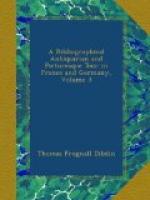Our road now became more hilly, and the time flew away quickly, without our making an apparently proportionate progress towards Salzburg. At length we reached Burckhausen; which is flanked by the river Salz on one side, and defended by a lofty citadel on the other. It struck us, upon the whole, as rather a romantic spot: but the road, on entering the town, is in some places fearfully precipitous. The stratum was little better than rock. We were not long in changing horses, and made off instantly for Tittmaning; the last stage but one on that side of Salzburg. The country wore a more pleasing aspect. Stately trees spread their dark foliage on each side of the road; between the stems, and through the branches of which, we caught many a “spirit-stirring” view of the mountains in the neighbourhood of Salzburg—which, on our nearer approach, seemed to have attained double their first grandeur. After having changed horses at Tittmaning, and enjoyed a delightfully picturesque ride from Burckhausen thither, we dined at the following stage, Lauffen; a poor, yet picturesque and wildly-situated, large village. While the dinner was preparing, I walked to the extremity of the street where the inn is situated, and examined a small church, built there upon high ground. The cloisters were very striking; narrow and low, but filled with mural monuments, of a singular variety of character. It was quite evident, from numberless exhibitions of art—connected with religious worship—along the road-side, or attached to churches—that we had now entered a territory quite different from that of Baden, Wirtemberg, and even the northern part of Bavaria. Small crucifixes, and a representation of the Agony in the Garden, &c, presented themselves frequently to our view; and it seemed as if Austria were a land of even greater superstition than Bavaria.
On concluding our dinner, and quitting Lauffen, it grew dusk, and the rain began to fall in a continued drizzling shower. “It always rains at Salzburg, sir,” said the valet—repeating the information of the post boy. This news made us less cheerful on leaving Lauffen than we were on quitting Altoeting: but “hope travelled through”—even till we reached the banks of the river Salz, within a mile or two of Salzburg—where the Austrian dominions begin, and those of Bavaria terminate. Our carriage was here stopped, and the trunks were examined, very slightly, on each side of the river. The long, wooden, black and yellow-striped bar of Austria—reaching quite across the road—forbade further progress, till such examination, and a payment of four or five florins, as the barrier-tax,—had been complied with. I had imagined that, if our trunks had been examined on one side of the water, there needed no examination of them on the other; unless we had had intercourse with some water fiend in the interval. It seemed, however, that I reasoned illogically. We were detained full twenty minutes, by a great deal of pompous palaver—signifying nothing—on the part of the Austrian commissioner; so that it was quite dark when we entered the barriers of the town of Salzburg:—mountains, trees, meadows, and rivulets having been long previously obliterated from our view.




